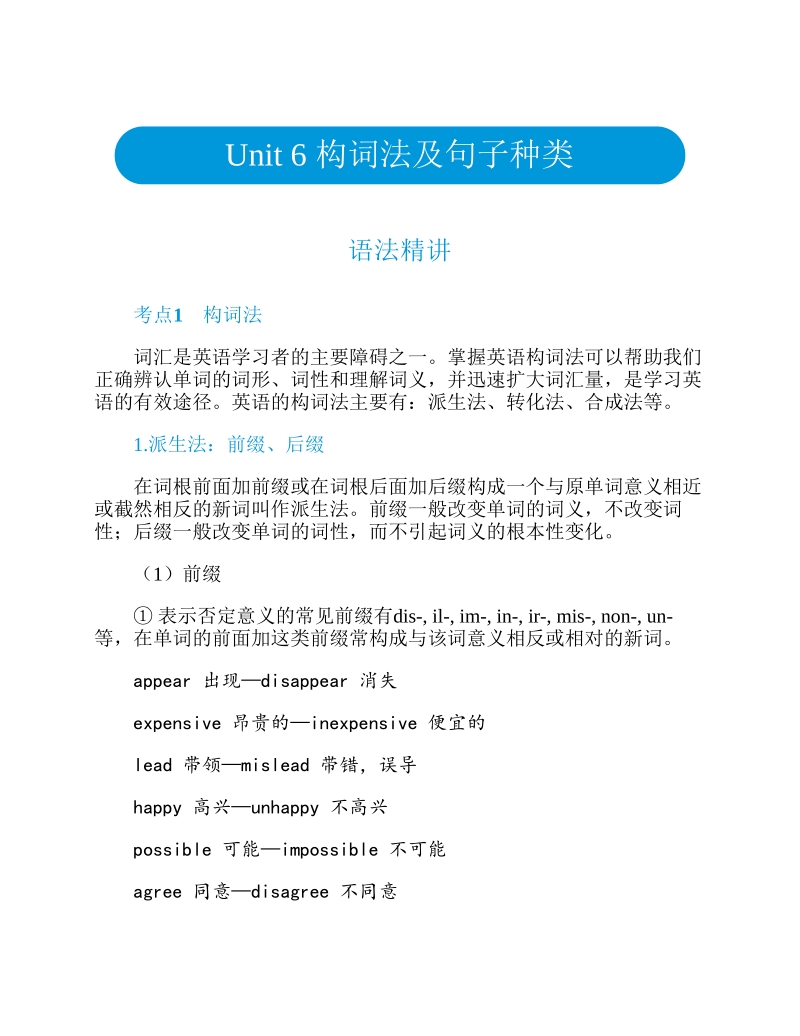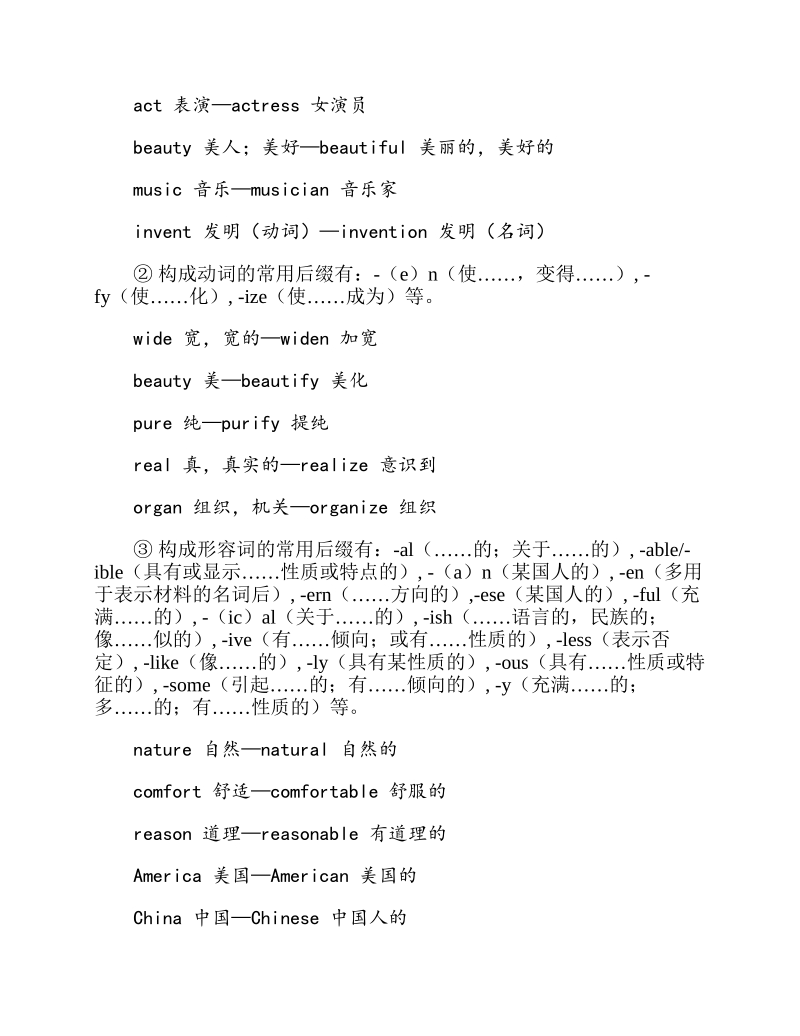 2020年中考语法专项训练之构词法及句子种类讲解及练习
2020年中考语法专项训练之构词法及句子种类讲解及练习
《2020年中考语法专项训练之构词法及句子种类讲解及练习》由会员分享,可在线阅读,更多相关《2020年中考语法专项训练之构词法及句子种类讲解及练习(24页珍藏版)》请在七七文库上搜索。
1、Unit 6 构词法及句子种类 语法精讲 考点1 构词法 词汇是英语学习者的主要障碍之一。掌握英语构词法可以帮助我们 正确辨认单词的词形、词性和理解词义,并迅速扩大词汇量,是学习英 语的有效途径。英语的构词法主要有:派生法、转化法、合成法等。 1.派生法:前缀、后缀 在词根前面加前缀或在词根后面加后缀构成一个与原单词意义相近 或截然相反的新词叫作派生法。前缀一般改变单词的词义,不改变词 性;后缀一般改变单词的词性,而不引起词义的根本性变化。 (1)前缀 表示否定意义的常见前缀有dis-, il-, im-, in-, ir-, mis-, non-, un- 等,在单词的前面加这类前缀常构成与
2、该词意义相反或相对的新词。 appear 出现disappear 消失 expensive 昂贵的inexpensive 便宜的 lead 带领mislead 带错,误导 happy 高兴unhappy 不高兴 possible 可能impossible 不可能 agree 同意disagree 不同意 表示其他意义的常见前缀有:a-(多构成表语形容词), anti- (反对;抵抗),auto-(自动), co-(共同), en-(使), inter-(互相; 在之间), re-(再;又),sub-(下面的;次;小), tele-(强调距 离)等。 like 像的(adj.)alike 同样的
3、,相似的(adj.) nuclear 核的;核武器的antinuclear 反对使用核武器的 bike 自行车autobike 摩托车 operate 操作cooperate 合作 joy 高兴enjoy 使高兴 net 网Internet 互联网 use 使用reuse 再用;重新使用 way 道路subway 地铁 (2)后缀 英语单词不仅可以通过加前缀构成新词,也可加后缀构成新词。后 缀通常会改变单词的词性,构成意义相近的其他词性;少数后缀还会改 变词义,变为与原来词义相反的新词。 构成名词的常用后缀有:-ance/-ence(的动作或状态), - (e)r/-or(从事某事的人), -
4、ese(某地人), -ess(女性;雌性), - ian(精通的人), -ist(专业人员), -ment(性质;状态), -ness(性质;状态), -tion(动作;过程) 等。 differ 不同于difference 区别 write 写writer 作家 Japan 日本Japanese 日本人 act 表演actress 女演员 beauty 美人;美好beautiful 美丽的,美好的 music 音乐musician 音乐家 invent 发明(动词)invention 发明(名词) 构成动词的常用后缀有:-(e)n(使,变得), - fy(使化), -ize(使成为)等。 w
5、ide 宽,宽的widen 加宽 beauty 美beautify 美化 pure 纯purify 提纯 real 真,真实的realize 意识到 organ 组织,机关organize 组织 构成形容词的常用后缀有:-al(的;关于的), -able/- ible(具有或显示性质或特点的), -(a)n(某国人的), -en(多用 于表示材料的名词后), -ern(方向的),-ese(某国人的), -ful(充 满的), -(ic)al(关于的), -ish(语言的,民族的; 像似的), -ive(有倾向;或有性质的), -less(表示否 定), -like(像的), -ly(具有某性质
6、的), -ous(具有性质或特 征的), -some(引起的;有倾向的), -y(充满的; 多的;有性质的)等。 nature 自然natural 自然的 comfort 舒适comfortable 舒服的 reason 道理reasonable 有道理的 America 美国American 美国的 China 中国Chinese 中国人的 gold 金子golden 金的 east 东eastern 东方的 child 孩子childish 孩子气的 snow 雪snowy 下雪的,有雪的 构成副词的常用后缀有:-ly(主要用于形容词之后表示方式或 程度), -ward(s)(主要用于表示
7、方位的词之后表示方向)等。 angry 生气的angrily 生气地 to 到towards 朝,向 east 东方eastward 向东 构成数词的常用后缀有:-teen(十几), -ty(几十), -th(构成 序数词)。 six 六sixteen 十六sixteenth 第十六 four 四forty 四十fortieth 第四十 2.转化法 英语中,有的名词可作动词,有的形容词可作副词或动词,这种把 一种词性用作另一种词性而词形不变的方法叫作转化法。 (1)动词转化为名词 动词可以转化为名词,大多含义变化不大。 We walk to school every day. 我们每天步行去学
8、校。(walk“走路,步行”,为动词) Lets go out for a walk. 我们到外面去散散步吧。(walk“散步,走路”,为名词,) 有时动词转化为名词含义有一定变化。 They build thousands of house every year. 他们每年建造成千上万的房子。(build“建造”,为动词,) He is a man of strong build. 他是一名体格健壮的男子。 (build“体形,体格”,为名词) 有的与一个动词和不定冠词一起构成一个新的短语,表示一个 动作。 He swims in the river every summer. 他每年夏天都
9、在河里游泳。 (swim“游泳”,为动词) Lets have a swim. 咱们游泳吧。 (swim与动词have和冠词a,共同构成短语:have a swim) (2)名词转化为动词 很多表示物件(如book)、身体部位(如hand)、某类人(如 nurse)的名词可以用作动词来表示动作,某些抽象名词(如lunch)也 可作动词。 Did you book a seat on the plane? 你订好飞机座位了吗?(book“预订”,为动词) Please hand me the book. 请把那本书递给我。(book“书”,为名词) She nursed her husband
10、back to health. 她看护丈夫,使他恢复了健康。 (nurse“看护,护理”,为动词) We lunched together at the newly opened restaurant. 我们在这家新开的餐厅一起吃了午餐。 (lunch“吃午餐”,为动词) (3)形容词转化为动词 有少数形容词可以转化为动词。 We will try our best to better our living conditions. 我们要尽力改善我们的生活状况。 (better本身是形容词,在此处用作动词,意为“使更好”) (4)副词转化为动词 有少数副词可以转化为动词。 We should
11、make the effort to further the cause of peace. 我们应当努力推动和平事业。 (further本身为副词,意为“进一步地”,但此处用作动词,意 为“推动,推进”) (5)形容词转化为名词 表示颜色的形容词常可转化为名词。 You should be dressed in black at the funeral. 你在葬礼中该穿黑色衣服。 (black此处作名词) 某些形容词,如old, young, poor, rich, wounded, injured等,与the 连用,表示一类人,作主语时,谓语用复数。 The old in our vill
12、age are living a happy life. 我们村的老年人过着幸福的生活。 (the old“老年人”,表示一类人) 3.合成法 两个或两个以上的词合成一个新词的构词方法称为合成法。 (1)复合名词的主要构成方式有: 名词+名词:newspaper 报纸 teamwork 协作 形容词+名词:blackboard 黑板 highway 公路 副词+名词 :overcoat 大衣 underground 地铁 名词+介词短语:father-in-law 岳父/公公 mother-in-law 岳母/婆婆 (2)复合动词的主要构成方式: 副词+动词:update 更新 overloo
13、k 忽视 名词+动词:sun-bathe 沐日光浴 proof-read 校对 (3)复合代词的主要构成方式: 宾格代词或物主代词+ self/selves:ourselves 我们自己 itself 它自己,本身 某些不定代词+ body/thing/one:nobody 没有人 everything 一切,一切事情 (4)复合形容词的主要构成方式: 名词+形容词:colour-blind 色盲的 副词+形容词:over-sensitive 过分敏感的 名词+分词:hand-made 手工制作的 形容词+名词:good-looking 好看的 副词+分词:well-known 众所周知的;有
14、名的 outstanding 出色的 形容词+名词:gentleman 绅士 greengrocer 蔬菜水果店 形容词+名词+ -ed:ill-mannered 不礼貌的 数词+名词+ -ed:two-faced 两面派的,言行不一致的 one-sided 片面的 名词+名词+ -ed:iron-willed 有钢铁意志的 (4)复合副词的主要构成方式 介词+名词:beforehand 事先 形容词+名词:meanwhile 同时 single-handed 单独地,单枪匹马地 考点2 句子种类 英语中的句子按其使用目的可分为:陈述句、疑问句、祈使句和感 叹句。 Chinese is one
15、 of the major languages in the world. 中文是世界主要语言之一。(陈述句) Who is your favorite teacher? 谁是你最喜爱的老师?(疑问句) Dont smoke in the office. 请不要在办公室吸烟。(祈使句) What a lovely son you have! 你儿子真可爱啊!(感叹句) 1.陈述句(分为:肯定句和否定句) (1)含义 用来陈述一个事实或是表达说话者看法的句子,叫作陈述句。句末 用句号表示句子的结束。陈述句分为肯定句和否定句。 (2)结构 主语+谓语 I do my homework after
16、school. 我在放学后做作业。 主语+连系动词+表语 Tom is a smart student. 汤姆是一名聪明的学生。 (3)肯定句变否定句的规则 陈述句可以细分为肯定句和否定句。肯定句变为否定句时需借助于 否定词not,将not置于第一个助动词、be动词或情态动词之后;因为一 般现在时和一般过去时陈述句的谓语动词不含助动词,需在动词前面加 do(does)或did,再加not。 She has not been sleeping well recently. 她近来睡得不太好。 The Frenchwoman can not speak English. 这位法国女士不会说英语。
17、We usually do not stay up late. 我们一般不熬夜。 在非正式文体中,否定结构常用缩略式,例如:isnt, arent, didnt, cant等。在某些情况下,主语和谓语动词可以倒装,例如:Here comes my brother.我弟弟来了。 2.疑问句(一般疑问句、特殊疑问句、选择疑问句) 用以提问的句子被称为疑问句(interrogative sentence)。疑问句句 末需用问号。疑问句主要分为一般疑问句、特殊疑问句、选择疑问句 等。 (1)一般疑问句(general question) 需要用肯定词yes或否定词no来回答,因此也称作“是非疑问 句”



- 配套讲稿:
如PPT文件的首页显示word图标,表示该PPT已包含配套word讲稿。双击word图标可打开word文档。
- 特殊限制:
部分文档作品中含有的国旗、国徽等图片,仅作为作品整体效果示例展示,禁止商用。设计者仅对作品中独创性部分享有著作权。
- 关 键 词:
- 2020 年中 语法 专项 训练 构词法 句子 种类 讲解 练习
 七七文库所有资源均是用户自行上传分享,仅供网友学习交流,未经上传用户书面授权,请勿作他用。
七七文库所有资源均是用户自行上传分享,仅供网友学习交流,未经上传用户书面授权,请勿作他用。



 浙公网安备33030202001339号
浙公网安备33030202001339号
链接地址:https://www.77wenku.com/p-147282.html